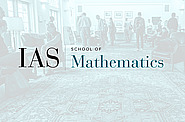Seminars Sorted by Series
Computer Science/Discrete Mathematics Seminar II
May
11
2010
May
18
2010
Computer Science/Discrete Mathematics Seminar II
Reductions Between Expansion Problems
10:30am|West Bldg. Lecture Hall
May
25
2010
Sep
21
2010
Computer Science/Discrete Mathematics Seminar II
Invariance Principles in Theoretical Computer Science
10:30am|S-101
Sep
28
2010
Computer Science/Discrete Mathematics Seminar II
High-Rate Codes with Sublinear Time Decoding
10:30am|S-101
Oct
05
2010
Computer Science/Discrete Mathematics Seminar II
Pseudorandom Generators for CCO[p] and the Fourier Spectrum of Low-Degree Polynomials Over Finite Fields
10:30am|S-101
Oct
12
2010
Computer Science/Discrete Mathematics Seminar II
Approximating the Longest Increasing Subsequence in Polylogarithmic Time
10:30am|S-101
Oct
19
2010
Computer Science/Discrete Mathematics Seminar II
Rank Bounds for Design Matrices with Applications to Combinatorial Geometry and Locally Correctable Codes
10:30am|S-101
Oct
26
2010
Nov
02
2010
Computer Science/Discrete Mathematics Seminar II
Fourier Spectrum of Polynomials Over Finite Fields
10:30am|S-101
Nov
02
2010
Computer Science/Discrete Mathematics Seminar II
3/2 Firefighters Are Not Enough
Rani Hod
11:30am|S-101
Nov
09
2010
Computer Science/Discrete Mathematics Seminar II
An Elementary Proof of the Restricted Invertibility Theorem
10:30am|S-101
Nov
16
2010
Computer Science/Discrete Mathematics Seminar II
Planar Convexity, Infinite Perfect Graphs and Lipschitz Continuity
10:30am|S-101
Nov
23
2010
Computer Science/Discrete Mathematics Seminar II
Counting Pattern Avoiding Permutations Via Integral Operators
10:30am|S-101
Nov
30
2010
Computer Science/Discrete Mathematics Seminar II
Hardness Escalation and the Rank of Polynomial Threshold Proofs
10:30am|S-101
Dec
14
2010
Computer Science/Discrete Mathematics Seminar II
Erdos Distinct distance Problem in the Plane
10:30am|S-101
Jan
18
2011
Computer Science/Discrete Mathematics Seminar II
Efficiently Learning Mixtures of Gaussians
10:30am|S-101
Jan
25
2011
Computer Science/Discrete Mathematics Seminar II
Learning with Boolean Threshold Functions, a Statistical Physics Perspective
R\'emi Monasson
10:30am|S-101
Feb
01
2011
Computer Science/Discrete Mathematics Seminar II
On The Complexity of Computing Roots and Residuosity Over Finite Fields
10:30am|S-101
Feb
08
2011
Computer Science/Discrete Mathematics Seminar II
Bypassing UGC From Some Optimal Geometric Inapproximability Results
Rishi Saket
10:30am|S-101
Feb
15
2011
Computer Science/Discrete Mathematics Seminar II
Automatizability and Simple Stochastic Games
10:30am|S-101
Feb
22
2011
Computer Science/Discrete Mathematics Seminar II
Local Testing and Decoding of Sparse Linear Codes
10:30am|S-101
Mar
08
2011
Computer Science/Discrete Mathematics Seminar II
Relativized Separations of Worst-Case and Average-Case Complexities for NP
10:30am|S-101
Mar
15
2011
Computer Science/Discrete Mathematics Seminar II
A PRG for Gaussian Polynomial Threshold Functions
Daniel Kane
10:30am|S-101
Mar
29
2011
Computer Science/Discrete Mathematics Seminar II
General Hardness Amplification of Predicates and Puzzles
Grant Schoenbeck
10:30am|S-101
Apr
05
2011
Apr
19
2011
Apr
26
2011
May
03
2011
Computer Science/Discrete Mathematics Seminar II
CSDM Seminars II will be resume first term of the 2011-12 academic year
10:30am|S-101
Sep
20
2011
Computer Science/Discrete Mathematics Seminar II
Existence of Small Families of t-wise Independent Permutations and t-Designs Via Local Limit Theorems
10:30am|S-101
Sep
27
2011
Computer Science/Discrete Mathematics Seminar II
Tight Lower Bounds for 2-query LCCs Over Finite fields
10:30am|S-101
Oct
04
2011
Computer Science/Discrete Mathematics Seminar II
Limit Theories and Higher Order Fourier Analysis
10:30am|S-101
Oct
11
2011
Computer Science/Discrete Mathematics Seminar II
Limit Theories and Higher Order Fourier Analysis
10:30am|S-101
Oct
18
2011
Computer Science/Discrete Mathematics Seminar II
Rigidity of 3-Colorings of the d-Dimensional Discrete Torus
Ohad Feldheim
10:30am|S-101
Oct
25
2011
Nov
01
2011
Computer Science/Discrete Mathematics Seminar II
No seminar
No Seminar (CCI Quantum Computation Workshop)
10:30am|S-101
Nov
08
2011
Computer Science/Discrete Mathematics Seminar II
Vertex Sparsification: An Introduction, Connections and Applications
10:30am|S-101
Nov
15
2011
Computer Science/Discrete Mathematics Seminar II
Vertex Sparsification: An Introduction, Connections and Applications
10:30am|S-101
Nov
22
2011
Computer Science/Discrete Mathematics Seminar II
Shorter Long Code and Applications to Unique Games
10:30am|S-101
Nov
29
2011
Computer Science/Discrete Mathematics Seminar II
Shorter Long Code and Applications to Unique Games
10:30am|S-101
Dec
06
2011
Computer Science/Discrete Mathematics Seminar II
Can the Continuum Problem be Solved?
Menachem Magidor
10:30am|S-101
Dec
13
2011
Computer Science/Discrete Mathematics Seminar II
Time-Space Tradeoffs in Resolution: Superpolynomial Lower Bounds for Superlinear Space
10:30am|S-101
Jan
24
2012
Computer Science/Discrete Mathematics Seminar II
A Tutorial on the Likely Worst-Case Complexities of NP-Complete Problems
10:30am|S-101
Jan
31
2012
Computer Science/Discrete Mathematics Seminar II
A Survey of Lower Bounds for the Resolution Proof System
10:30am|S-101
Feb
07
2012
Feb
14
2012
Feb
21
2012
Computer Science/Discrete Mathematics Seminar II
Finding Needles in Exponential Haystacks
10:30am|S-101
Feb
28
2012
Computer Science/Discrete Mathematics Seminar II
Complexity, Approximability, and Mechanism Design
Christos Papadimitriou
10:30am|S-101
Mar
06
2012
